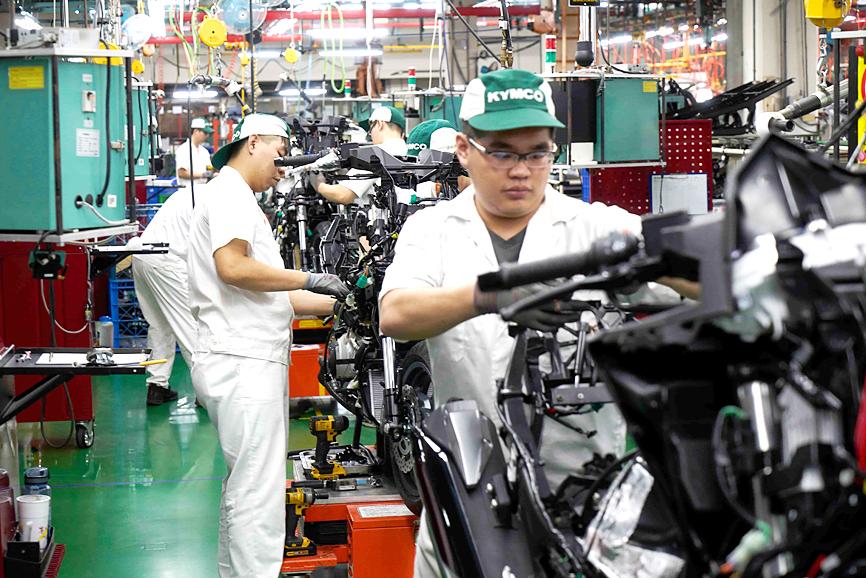Scooter and motorcycle maker Kwang Yang Motor Co (光陽工業) yesterday said it expects chip constraints to be alleviated by the end of the year at the earliest, after struggling with chip supply since the second quarter.
In addition to chip shortages, rising manufacturing costs due to higher shipping and raw material prices in the first half of this year placed pressure on the company’s profitability, chairman Allen Ko (柯勝峰) said.
“We have been grappling with a chip supply issue over the past few months,” Ko said. “Supply is tight, and we have had to push back shipments by between 20,000 and 30,000 vehicles for overseas markets.”

Photo courtesy of Kwang Yang Motor Co
Demand from the US market has been soaring this year, thanks to the administration of US President Joe Biden’s stimulus packages to revive the economy, Ko said.
“The company’s sales in the US jumped to record highs this year. We could not supply as many vehicles as customers ordered,” because of the chip shortage, he said.
Kwang Yang and its peers are at a disadvantage when securing chip supply compared with smartphone and other electronics makers, due to their smaller market scale, Ko said.
Moreover, chips used in scooters are made using less advanced technologies, but are highly customized, he added.
After some recent positive developments, the company believes “there is a chance the chip shortage could ease in the fourth quarter,” Ko said.
To satisfy foreign customers’ demand, Kwang Yang was forced to source chips on the spot market at prices 10 times higher than normal, Kwang Yang chief executive officer Ko Chun-ping (柯俊斌) said last week.
Due to insufficient chip supply, Kwang Yang has seen its scooter inventory in Taiwan drop to 20,000 vehicles, which is less than half of its monthly sales, it said.
Aside from chips, there is speculation that supply of electric batteries could become tight soon, but Allen Ko said that would not be a serious concern for Kwang Yang as it should be on its suppliers’ priority lists due to the leading position it enjoys in the electric scooter industry, he added.
Kwang Yang mainly sources batteries from LG Chem Ltd.
Allen Ko said scooter sales in Taiwan are expected to plunge 30 percent year-on-year this quarter, worsening from an annual decline of 23 percent last quarter and 10 percent in the first quarter.
The company has also lowered its forecast for scooter sales in Taiwan this year to below 850,000 units, down about 19 percent from the 1.05 million units sold last year.

SEEKING CLARITY: Washington should not adopt measures that create uncertainties for ‘existing semiconductor investments,’ TSMC said referring to its US$165 billion in the US Taiwan Semiconductor Manufacturing Co (TSMC, 台積電) told the US that any future tariffs on Taiwanese semiconductors could reduce demand for chips and derail its pledge to increase its investment in Arizona. “New import restrictions could jeopardize current US leadership in the competitive technology industry and create uncertainties for many committed semiconductor capital projects in the US, including TSMC Arizona’s significant investment plan in Phoenix,” the chipmaker wrote in a letter to the US Department of Commerce. TSMC issued the warning in response to a solicitation for comments by the department on a possible tariff on semiconductor imports by US President Donald Trump’s

The government has launched a three-pronged strategy to attract local and international talent, aiming to position Taiwan as a new global hub following Nvidia Corp’s announcement that it has chosen Taipei as the site of its Taiwan headquarters. Nvidia cofounder and CEO Jensen Huang (黃仁勳) on Monday last week announced during his keynote speech at the Computex trade show in Taipei that the Nvidia Constellation, the company’s planned Taiwan headquarters, would be located in the Beitou-Shilin Technology Park (北投士林科技園區) in Taipei. Huang’s decision to establish a base in Taiwan is “primarily due to Taiwan’s talent pool and its strength in the semiconductor

An earnings report from semiconductor giant and artificial intelligence (AI) bellwether Nvidia Corp takes center stage for Wall Street this week, as stocks hit a speed bump of worries over US federal deficits driving up Treasury yields. US equities pulled back last week after a torrid rally, as investors turned their attention to tax and spending legislation poised to swell the US government’s US$36 trillion in debt. Long-dated US Treasury yields rose amid the fiscal worries, with the 30-year yield topping 5 percent and hitting its highest level since late 2023. Stocks were dealt another blow on Friday when US President Donald

UNCERTAINTY: Investors remain worried that trade negotiations with Washington could go poorly, given Trump’s inconsistency on tariffs in his second term, experts said The consumer confidence index this month fell for a ninth consecutive month to its lowest level in 13 months, as global trade uncertainties and tariff risks cloud Taiwan’s economic outlook, a survey released yesterday by National Central University found. The biggest decline came from the timing for stock investments, which plunged 11.82 points to 26.82, underscoring bleak investor confidence, it said. “Although the TAIEX reclaimed the 21,000-point mark after the US and China agreed to bury the hatchet for 90 days, investors remain worried that the situation would turn sour later,” said Dachrahn Wu (吳大任), director of the university’s Research Center for